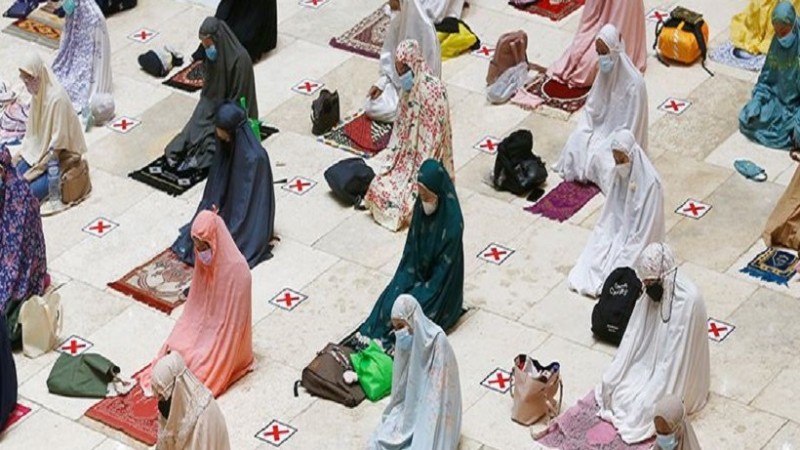KH Afifuddin Muhajir
In determining the beginning of the months of Ramadan and Shawwal to start and end fasting, until now jumhur (the majority of Muslim scholars) have based their ideas on rukyat (moon sighting). What is meant is to see the new moon (هلال) with the eyes (رؤية بصرية), not through a scientific vision (رؤية علمية) by using calculations (حساب).
If (using) real vision with eyes does not occur for it is blocked by clouds, they need to fulfill the month of Sya'ban / Ramadhan to 30 days.
Their basis is the hadith narrated by Abu Hurairah that the Prophet (PBUH) said:
Fast when you see the moon (Ramadan) and stop fasting when you see the moon of Shawwal. If the new moon is closed for you, then fulfill the month of sya'ban to 30 days, "(Narrated by al-Bukhari and Muslim)
In the hadith of Ibn Umar, the Prophet (PBUH) said:
"Do not fast so that you see the new moon (Ramadan) and do not stop fasting so you see the Shawwal hilal. If the new moon is closed for you then ... "
For the majority of Muslim scholars, the word of the Prophet (فاقدروا له) is an interpretation / explanation of the words of the Prophet in the first hadith, (فأكملواعدة) which means: complete (the fasting) to 30 days.
One of the prominent figures of the Syafi'iyah school of thought, Abu al-Abbas Ahmad ibn Umar ibn Suraij compromised the two hadith above by using an approach which in the term is now called a multi-dimensional theory (نظرية تعدد الأبعاد), namely that the Prophet's words (فاقدرواله) means: "estimate the hilal by calculating its positions."
This is addressed to those who by Allah SWT were given the knowledge of hisab, while the words of the Prophet (فاكملوا عدة) were addressed to those who have no more knowledge about it (Fatawa al-Qardhawi).
What is interesting is the opinion of Imam Taqyuddin al-Subki, who is claimed to have the capacity as a mujtahid. His point of view on this issue was stated among others by Sayyid Abu Bakr Syatha in the so-called Hasyiyah I'anah al-Thalibin:
"If one person or two testified that he or they have seen the new moon while based on the hisab (calculation) the moon cannot be seen, then according to al-Subki their testimony could not be accepted, because the hisab is certain while the rukyat is presumptive, of course the presumtive decision cannot defeat the certain one.
The substance of this opinion is that the hisab is the basis in order to deny, not to stipulate.
Sayyid Abu Bakr Syatha commented on Imam al-Subki's opinion by saying:
"According to the most specific, the testimony could be accepted, because the opinion of the hisab experts is not mu'tabar."
The reason of Imam al-Subki: (لان الحساب قطعي والرؤية ظنية) to reject the rukyat when contradicting the hisab needs to be underlined then drawn to the current conditions in which modern astronomy has advanced and its accuracy is truly convincing (قطعي).
On account of this science, astronomers could predict the occurrence of several hundred years eclipses before they occur very accurately regarding the year, month, week, day and hour, even the minute.
With the accuracy (قطعي) of today's astronomy, the rukyat which was originally strongly taken into consideration (مظنونة), when it contradicts the hisab, it is a doubt (مشكوك فيها), even just an assumption (موهومة).
The Imam al-Subki's point of view is such a middle ground (المنهج الوسطي), as well as a venue for peace between the rukyat and hisab fanatics.
If the government adheres to this opinion, there is no need to prepare substantial energy and costs needed to monitor the hilal (الترائي)، when all astronomers agree that the hilal is impossible to see.
١. فإن غبي عليكم فأكملوا عدة شعبان ثلاثين يوما
٢. فإن غمٌ عليكم فاقدروا له
وإن كان أحدهما تفسيرا للآخر فالصواب أن المفسّر هو الاول للثاني المجمل ، لا العكس
The writer is professor of ushul fiqh, Ma'had Aly Situbondo
Terpopuler
1
Khutbah Jumat: Larangan Pamer dan Bangga dengan Dosa-dosa
2
Khutbah Jumat: Membumikan Akhlak Nabi di Tengah Krisis Keteladanan
3
Khutbah Jumat: Sesuatu yang Berlebihan itu Tidak Baik, Termasuk Polusi Suara
4
Trump Turunkan Tarif Impor Jadi 19 Persen, Ini Syarat yang Harus Indonesia Penuhi
5
Khutbah Jumat: Meneguhkan Qanaah dan Syukur di Tengah Arus Hedonisme
6
Sejumlah SD Negeri Sepi Pendaftar, Ini Respons Mendikdasmen
Terkini
Lihat Semua













